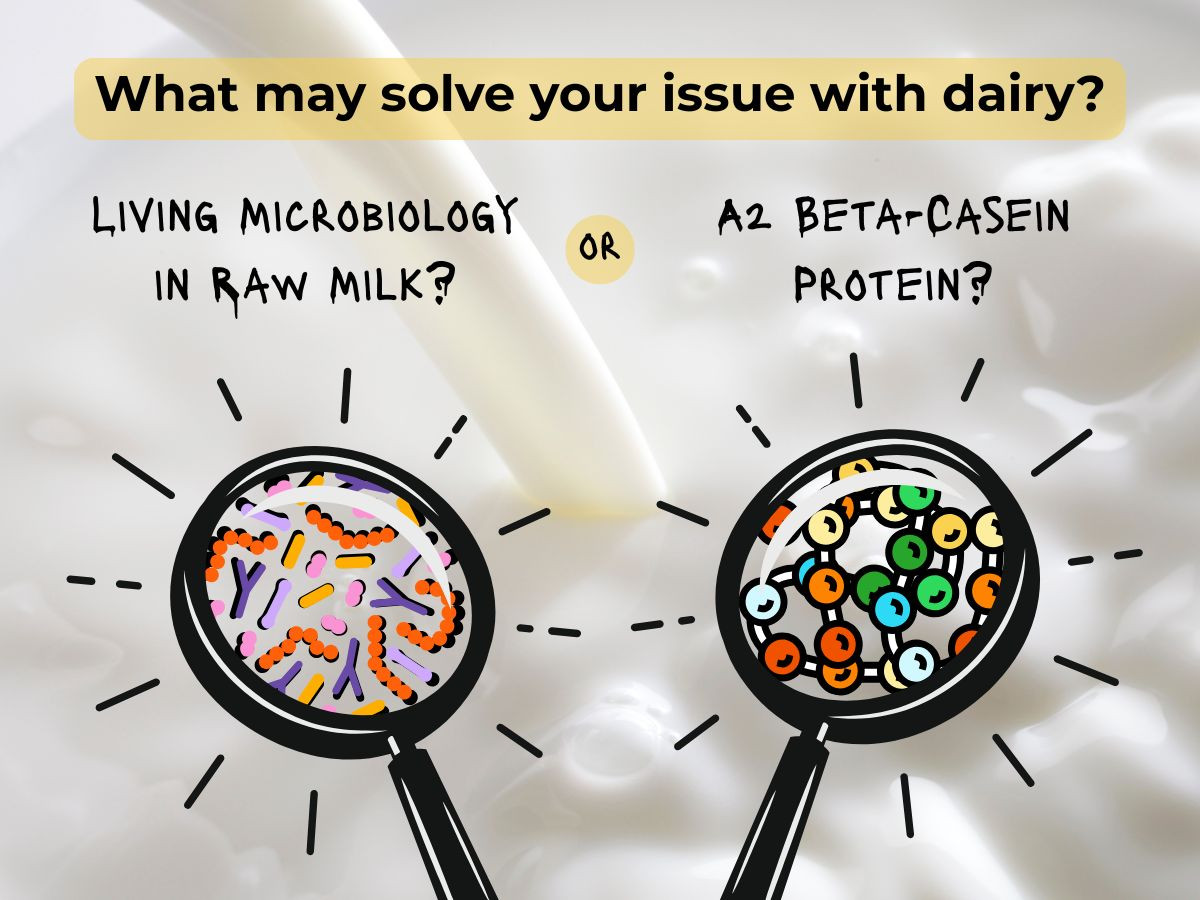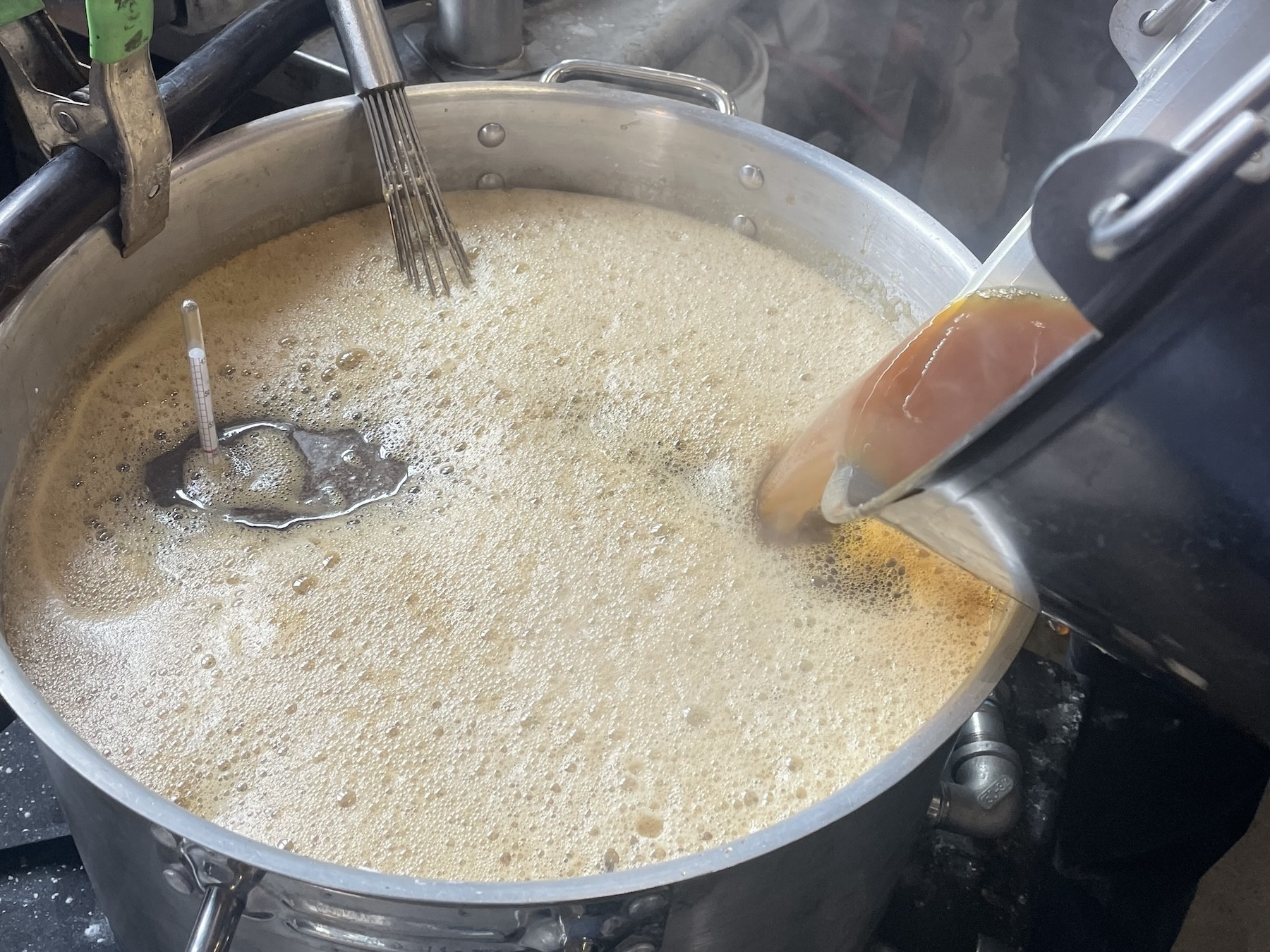AT A GLANCE:
Maltodextrin is a simple sugar used to jumpstart freeze dried cultures in fermented dairy.Maltodextrin is a lab-produced ingredient. Overconsumption can result in negative health outcomes.Trace amounts of maltodextrin are in (nearly) ALL dairy products (yogurt, kefir, cheese, etc), but you won't find it on a food label. Why? Maltodextrin (and other additives) only need to be disclosed if they're more than 1% of the final product. The difference with Miller's is that we tell you about the nitty gritty details like this one.There's, at most, 0.0025% maltodextrin in our fermented dairy. Can we round that to zero?Miller's dairy contains maltodextrin that's "certified for organic".The only way to create fermented dairy without maltodextrin is to use a wild culture. The drawbacks are you need to maintain those cultures, they are inconsistent, and might even stop working over time.
----------
If you dove deep on our website and clicked on a product to get all the nitty gritty details, you may have noticed the "Honest Disclosure" section. That's right. We believe you deserve to know everything about your food - the big, the small, the good... and even the bad.
On most of our fermented dairy (cheese, yogurt, kefir, cottage cheese, etc), you may have noticed a message saying that the freeze dried culture contains a trace amount of maltodextrin 😱
And you may have thought, "What!? I thought they made the most natural food around!"
You're right. We do aim to provide you with the most natural foods around, from the farming practices to how they're made in small batches. We want you to have max nutrition and the least toxins possible.
And honestly, we're not thrilled to have even a trace of a trace amount of maltodextrin in our fermented dairy. But, sadly, there's simply no way to do that nowadays, especially considering the demand for specific flavors, consistent textures, and a reliable food source.
Like seriously, when it comes to maltodextrin, the only difference between Miller's dairy and any other dairy (whether from a supermarket or a farm) is that we did the research and are actually telling you about it. We don't need to. It's not required. But... you deserve to know.
So, what's going on with maltodextrin? There's so much more to this story! Keep reading to be a smart natural food shopper and get all the info.
What is maltodextrin anyway?
Maltodextrin is a sugar, a very simple sugar. Scientifically speaking, it's "short chains of glucose units", a type of "oligosaccharide".
Maltodextrin is 100% a lab-produced ingredient. They take a starch (a complex carbohydrate that your body would digest into sugar) and break it down using enzymes or acids. The result is a simple sugar. Labs are basically cutting that long, complex chain that makes up a starch into shorter, simpler segments.
Maltodextrin can be made from a bunch of different kinds of starches - corn, wheat, rice, potato, cassava, etc. In the US, it's most commonly made with corn. Depending on what the maltodextrin is derived from and how it's made, it can have different properties and uses.
It's most commonly dried into a white powder but can also be found in syrup form.
Maltodextrin is used in food as a stabilizer, thickener, anti-caking agent, and bulking agent. I mean, it's in soooo many processed foods. It can also be used in livestock feed or healthcare products as an easily digestible sugar source.
Maltodextrin does NOT need to be certified organic in healthcare products (supplements, etc). But, it does need to be certified organic in livestock feed and foods that are certified organic.
What would make maltodextrin certified organic? It's how it's broken down. According to OMRI (the Organic Materials Review Institute that approves things for organic use), maltodextrin made with acid is NOT certified organic. Maltodextrin made with enzymes is certified organic. Apparently they believe the enzymatic way is considered "natural".
Why would people want to avoid maltodextrin?
The FDA classes maltodextrin as a GRAS (generally recognized as safe) food additive. That being said, there are known risks to consuming maltodextrin, especially in larger amounts (which you can absolutely get from processed foods).
Here are some potential negative health consequences of overconsumption of maltodextrin:
High cholesterolWeight gainType 2 diabetesBlood sugar spikes (particularly in people with diabetes or insulin resistance)Imbalance of gut bacteriaAllergies or intolerances (to corn or wheat) with a range of side effectsExposure to GMOs (when derived from GMO corn)
Keep in mind that any of the above side effects typically arise from consuming maltodextrin in large amounts. A trace amount usually won't negatively impact your health unless you have a severe allergy to it (or what it's derived from or made with).
What is a freeze dried culture?
Freeze dried cultures are surprisingly old. They originated in the late 1800s as a way to preserve the best cheese and dairy cultures and share them over distances. But the technology didn't become really good and reliable until the mid 1900s. That's when they started becoming popular.
The process to make them is fairly simple. Like, you can totally do it at home (maybe you've done it with sourdough starter...?). But... for best accuracy and use, freeze dried cultures are best for commercial use and are made in labs nowadays. Here's how it's done:
1- Strains of microorganisms are isolated and grown.
The first cultures were made by letting raw milk grow wild. Then, each strain of bacteria, yeast, etc was isolated. This can be done with a particular solution or by putting fermented raw milk on a medium that only supports a specific kind of microorganisms. It's kinda like terrain theory here.
Nowadays, labs generally aren't isolating their own cultures much. Instead, they're maintaining cultures separated a longtime ago.
It's kind of like culture makers are literal "micro farmers" growing microorganisms. But, instead of planting in the soil, they let each culture grow in pasteurized milk or a specific growing medium (like some kind of something scientific in a petri dish). And, it's 100% in a controlled lab environment. There might be one type of lactic acid bacteria multiplying in one tray and a certain kind of yeast in another.
2- Strains are freeze dried.
Each isolated strain is usually freeze dried individually.
A freeze dryer is a freezer... but with a vacuum that removes the air. Cool! You could freeze dry anything in a regular freezer, but it would take much much longer. The vacuum element of a freeze dryer makes it so any water turns right into vapor (or dries out) instead of turning to ice.
3- Strains are mixed together to make a specific culture "recipe".
It's like a recipe. It might be 3 parts Bifidobacterium lactis, 2 parts Lactobacillus acidophilus, and 1 part Lactobacillus delbrueckii subsp. bulgaricus. The specific strains mixed together are what give each fermented dairy product it's unique texture and flavor.
Other ingredients might be added for specific reasons. Sugars (like maltodextrin or sucrose) help keep the culture in good condition and aid it in coming back to life when used. Enzymes (like lipase) might be added to give better flavor. Or colors (like annatto or synthetic dyes) might be added for a desired yellow or orange color.
Why is maltodextrin added to freeze dried cultures?
In cheese cultures, maltodextrin has a double purpose. It's an anti-caking agent, keeping the culture as a powder... not an unusable clump. It's also a simple sugar that gives the culture something super easy to digest as it comes back to life. Without maltodextrin, freeze dried culture issues would be quite common. They would stop working or have spotty success.
How much maltodextrin ends up in the final product?
Maltodextrin is used in small amounts in a freeze dried culture. Maybe with some cultures it's more, but with ours, it's less than 1%. Just a little bit is needed.
I'm not sure about this with other dairy makers. But, I can tell you how much culture is in Miller's dairy items. For our cheese, about 1/2 tsp of culture is used in 1lb of cheese. For our fresh fermented dairy like yogurt or kefir, about 1 teaspoon of culture is used per quart of milk.
There are 96 teaspoons in a pound of cheese and 192 teaspoons in a quart of milk. So, culture alone is 0.5% or less of the final product. And, if maltodextrin is less than 1% of the culture, we're talking less than 0.005% maltodextrin.
On top of that, once the culture is added, it eats up that maltodextrin immediately. I mean, that's the whole point. It's a quick simple food to get those freeze dried cultures active again.
Let's say that only half of the maltodextrin is eaten by the cultures. Then there would be less than 0.0025% maltodextrin in the final product. Can we round that to zero...?
You see where I'm going. This is why we are ok with the level of maltodextrin in our cheese cultures. We absolutely wouldn't choose it as an ingredient. But, as it stands now, the only cultures available have maltodextrin. If you know of one that doesn't, please let me know!!!
If I'm NOT shopping at Miller's, how can I find out if maltodextrin is in my food?
Maltodextrin is only required on an ingredient list if it's more than 1% of the final product. If it's less than 1%, then it's not required on a food label, because it's considered a "trace amount". 1% and 0.0025% are very different trace amount levels but are treated the same when it comes to labeling.
In fact, when shopping for cheese cultures, maltodextrin typically isn't listed as an ingredient. The only way to find out is to look at the Safety Data Sheet or to call the manufacturer and cross your fingers that they'll talk to you.
I think that most farms or dairy makers that get this question would simply say, "Nope, there's no maltodextrin." But, that's not the way we roll at Miller's.
A few years ago, someone who had a severe allergy reached out about this. It led me down a rabbit hole, talking to the scientists behind our cultures. And now, I'm sharing what I learned with you.
Is there a way to make fermented dairy without maltodextrin, like a wild (not freeze dried) culture?
Sure, wild cultured dairy is 100% a thing. It's like the sourdough bread of the dairy world. But... as the name implies, the final product can be a bit "wild".
This is how we make our bursting kefirs. They're made with real kefir grains (a wild culture) that's been passed down in our community for generations. As this name implies, it can be explosive and super bubbly. It can be quite strong in flavor (not everyone's cup of tea). And it varies a lot from week to week.
If we made cheese with culture we saved, it wouldn't turn out the same every time. We wouldn't be able to have a reliable cheddar and gouda and mozzarella... we'd just have one cheese that turns out a little different every time.
If we made yogurt with culture we saved, it's a little more reliable. But, it still wouldn't give you the expected texture and flavor of the yogurt you're expecting. And, there would likely be weeks it simply didn't turn out right.
Which Miller's dairy products contain trace amounts of maltodextrin and which don't?
NO CULTURE = NO MALTODEXTRIN
MilkCreamHalf & HalfIce CreamButter ColostrumGhee
WILD CULTURE = NO MALTODEXTRIN
Bursting Kefir
FREEZE DRIED CULTURE = TRACE MALTODEXTRIN
CheeseYogurtMild KefirCottage CheeseSour Cream
What do you think? Are you ok with minuscule amounts of maltodextrin in fermented dairy? Why or why not? What trace ingredients are you most concerned about?
I'd love to hear from you. Comment below to share your thoughts with our amazing community (no account required), or contact us to keep it private 😊
-----
Sources
MaltodextrinWhat is maltodextrin and is it safe?Cheese Making Cultures FAQ Cultured Milk Starters











